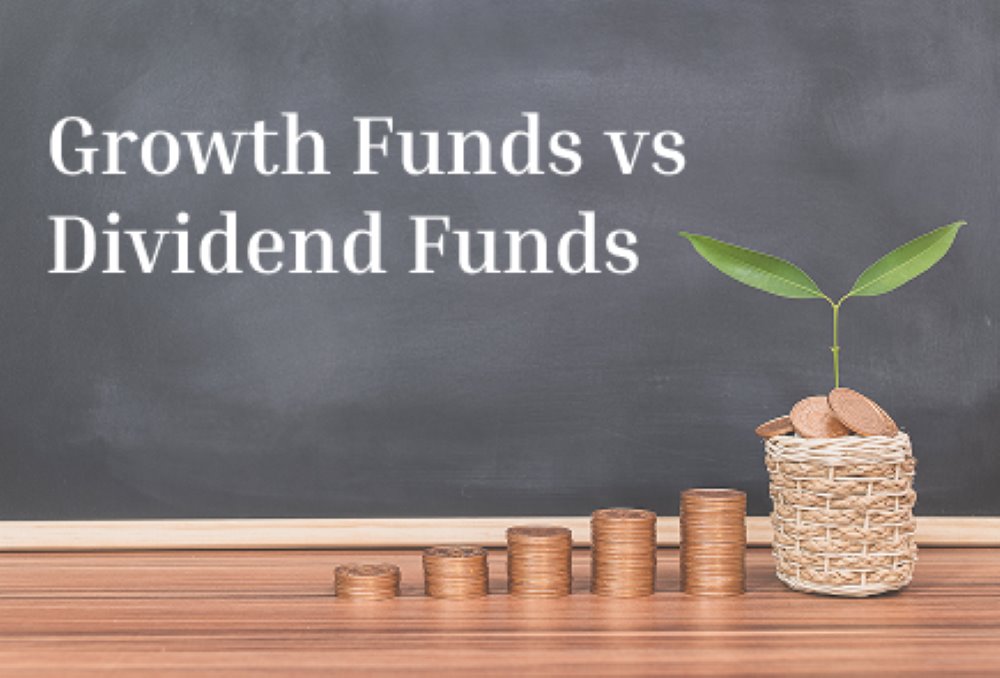Simplifying Life Insurance in India
Difference Between Growth vs Dividend Mutual Funds

Investment is full of choices and confusion, and the most pivotal decision is between growth and dividend mutual funds. Both serve different financial purposes, and knowing each type of investment is essential.
This article will explore the core differences between dividend and growth mutual funds and their pros and cons. By the end of the article, you can decide which mutual fund suits your investment the best.

Table of Contents

What are Growth Funds?
Growth funds are a group of mutual funds that focus on investing in equities of companies believed to have high growth. These funds suit investors willing to accept more market risks as long as they can get excellent returns over a long-term horizon. Thus, they are highly suitable for long-term plans.
Unlike income-oriented funds, growth funds do not disburse dividends. Instead, they focus on maximising the fund's net asset value (NAV), which is increased by reinvesting dividends into the business or company. These funds have an equity focus and are subsequently more volatile but give higher returns.
What are Dividend Funds?
Dividend funds are mutual funds that pay investors dividends from their earnings. These distributions come from the fund's income, such as a stock dividend or bond interest. Dividend funds are excellent for investors who need regular income and capital preservation, especially during volatile markets.
However, dividend payouts will be subject to the fund's performance and market conditions. Furthermore, with every payout, the NAV declines, reducing potential capital appreciation. Despite all these facts, these funds are in high demand by conservative investors who want a steady return and liquidity.
Key Differences Between Growth and Dividend Mutual Funds
Growth and dividend mutual funds are two popular investment options. Yet, each fulfils different financial goals. The table below depicts the differences between the two:
Types of Growth Funds
Depending upon the capitalisation of underlying stocks, various subcategories of growth funds exist. Here's a breakdown of the different types of growth funds:
Types of Dividend Options in Mutual Funds
Mutual funds offer dividend options that provide periodic income or allow earnings to be reinvested. Investors can select any of the two options based on their financial goals, including:
Growth Fund or Dividend Fund: Which is Better for You?
The choice between a growth fund and a dividend fund depends on the investor's financial objectives, risk, and the urgency of income generation.
1. Investment Focus
Growth funds invest earnings to compound wealth. Therefore, they are ideal for long-term investors with an eye on capital growth. Dividend funds distribute earnings as dividends. These offer income that can be reinvested.
2. Risk and Return Possibility
Growth funds have more potential for returns but have the risk attached. They can be known to bring more profit during long-term investment. Dividend funds bring stability, but payments rely on market emotions.
3. Investor Suitability
Growth funds are suited for the aggressive investor who needs more return but can accept a higher level of risk. Dividend funds would be appropriate only for the more conservative investors.
4. Tax Considerations
Growth funds generally produce long-term capital gains, which are taxed long-term. This makes them tax-efficient for many investors. Dividend funds often have dividends taxed at a higher rate.
5. Liquidity and Flexibility
Growth funds are flexible because their shareholders can sell off shares to realise gains. So, they are more liquid than the others. Dividend funds are also liquid, but their flexibility may differ from the rest.
Disclaimer: The information provided on this website is for general informational purposes only and should not be construed as financial, investment, or legal advice. While we strive to provide accurate and up-to-date content, we do not guarantee the completeness, reliability, or suitability of the information for your specific needs.
We do not promote or endorse any financial product or service mentioned in these articles. Readers are advised to conduct their own research, consult with financial experts, and make informed decisions based on their unique financial circumstances. Any reliance you place on the information provided here is strictly at your own risk.
FAQs about Growth vs Dividend Mutual Fund
Can I switch from a dividend to a growth fund under the same scheme?
How are the NAVs of dividend and growth funds in the same scheme different?
Do growth funds outperform dividend funds in the long run?
What happens to dividends in a growth fund?
Are dividend reinvestment plans the same as growth funds?
Which is more tax efficient, growth or dividend fund?
Can dividend funds give consistent income during a market downturn?
Are growth funds riskier than dividend funds?
Are dividend funds suitable for short-term investors?
How do growth and dividend funds affect the diversification of a portfolio?
Should retirees choose dividend funds over growth funds?
Which is better, the growth fund or a dividend fund?
What is the difference between a dividend and a growth fund?
Other Important Articles about Mutual Funds
Disclaimer
- This is an informative article provided on 'as is' basis for awareness purpose only and not intended as a professional advice. The content of the article is derived from various open sources across the Internet. Digit Life Insurance is not promoting or recommending any aspect in the article or its correctness. Please verify the information and your requirement before taking any decisions.
- All the figures reflected in the article are for illustrative purposes. The premium for Coverage that one buys depends on various factors including customer requirements, eligibility, age, demography, insurance provider, product, coverage amount, term and other factors
- Tax Benefits, if applicable depend on the Tax Regime opted by the individual and the applicable tax provision. Please consult your Tax consultant before making any decision.
Latest News
Read More
















